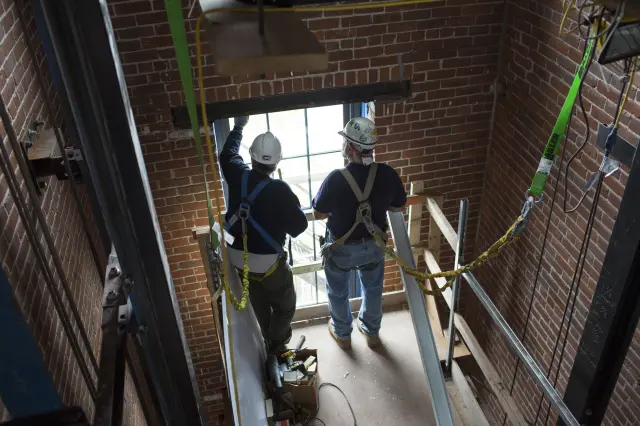-
Winter storm warnings for 6 states as 10 inches of snow to hit - 10 mins ago
-
Hong Kong Holds Vote as Officials Move Against ‘Anti-China’ Elements - 16 mins ago
-
Kirk Herbstreit Predicts Bad News for Notre Dame as CFP Selection Looms - 46 mins ago
-
Hong Kong Man Arrested After Posting Online About Deadly Fire - about 1 hour ago
-
Zac Gallen Predicted To Sign $135M Deal With NL Club Despite Cubs Rumors - about 1 hour ago
-
How Has Congestion Pricing Changed Your Year? - 2 hours ago
-
Ancient African city rises from ashes of colonialism - 2 hours ago
-
Fire in Goa, India, Kills at Least 25 - 2 hours ago
-
Warriors HC Steve Kerr Rips Into Two Players With Team Struggling - 3 hours ago
-
Alabama’s Kalen DeBoer Makes Clear Case for CFP After Loss to Georgia - 3 hours ago
These Are the Highest-Paying Blue-Collar Jobs
A new report from Resume Genius has revealed the highest-paying blue-collar jobs, and some of them pack six-figure annual salaries.
Elevator and escalator technicians captured the top spot, bringing in a $106,000 average yearly salary, with the top 10 percent earning as much as $149,000.
Why It Matters
Blue-collar work has attracted the attention of many new high school and even college graduates, as the salaries often outpace those offered for white-collar entry-level roles.
These jobs also present some higher job stability in many cases, with the perception that they are less susceptible to being replaced by artificial intelligence.

What To Know
The top 10 highest-paying blue-collar jobs, as reported by Resume Genius:
- Elevator and escalator technician
- Electrical power line installer and repairer
- Aircraft and avionics equipment mechanic and technician
- Railroad worker
- Stationary engineer and boiler operator
- Industrial machinery mechanic
- Plumber, pipefitter and steamfitter
- Wind turbine technician
- Electrician
- Solar photovoltaic (PV) installer
While the elevator and escalator technicians earned an average salary of $106,580, even the lower highest-paying blue-collar workers who were employed as solar photovoltaic installers brought in $51,860 per year.
“Most of these roles fall within the technician and electrical trades — jobs that don’t require a college degree but instead rely on on-the-job training, apprenticeships, or specific licensing. These are hands-on careers that demand real skill and, often, real physical work,” Kevin Thompson, CEO of 9i Capital Group and host of the 9innings podcast, told Newsweek.
The report was based on federal employment data, identifying the careers that offered a strong balance of high wages, accessibility and long-term career security.
“When you hear claims the next generation of American millionaires will be electricians and plumbers, you may be surprised to see a median yearly salary that doesn’t seem to reflect what we’d expect from the status of a millionaire,” Alex Beene, financial literacy instructor for the University of Tennessee at Martin, told Newsweek. “However, wages in these career fields can vary wildly based on taking on these positions through an employer as opposed to being self-employed.”
HR consultant Bryan Driscoll said the salaries show blue-collar jobs are finally being recognized for what they are: skilled, essential and increasingly lucrative.
“Elevator and escalator technicians topping $100K proves that high-paying, stable work doesn’t require a four-year degree,” Driscoll told Newsweek. “These roles are accessible, union-supported, and critical to infrastructure – a sharp contrast to the volatility we’re seeing in tech and white-collar sectors.
“Workers should know that demand for skilled trades is only climbing, especially in clean energy and maintenance. That’s not just job security – it’s proof the future of work still requires people to physically build things.”
What People Are Saying
Thompson also told Newsweek: “These are essential roles–the backbone of our economy. Whether it’s moving the nation’s food, maintaining the power grid, or keeping infrastructure running, these workers keep the country functioning. The work can be demanding, but the relevance and stability it provides can’t be overlooked.”
Beene also told Newsweek: “Undoubtedly, these career paths are currently greatly in-demand, but the path an individual going into one of these fields takes will determine just how much they can earn from them. Whereas some professions like elevator technician or aircraft mechanic would obviously be easier and more efficient through an employer, others have great opportunities through forming one’s own business.”
Driscoll also told Newsweek: “In terms of appeal, blue-collar careers are absolutely gaining ground. People are fed up with burnout culture and quiet promotions that come without pay. Trades offer a tangible sense of value and purpose, and often, a better paycheck.
“Long term, these findings highlight a shift in economic power. As younger generations question the return on college debt, the trades stand to reclaim the respect and compensation they’ve deserved all along.”
What Happens Next
Trade work will likely continue to remain attractive due to the higher pay, experts say. “There’s a shortage of skilled workers, and that limited supply has driven wages higher. But like anything in economics, once more people enter the space, wages will start to level off,” Thompson said.
“Long term, we’ll likely continue to see this back-and-forth between white-collar and blue-collar demand. As college costs rise and trade jobs remain lucrative, more people will realize that skill and certification can be just as valuable as a degree.”
Source link




















